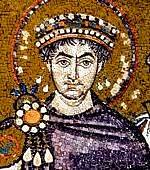The real Ithaca?
From this month’s Smithsonian Magazine:
Odyssey's End?: The Search for Ancient Ithaca
This is pretty cool. For the background, in case you weren’t paying attention: Ithaca (or, for the pedantically inclined, Ithaka), of course, was the homeland of the hero of Homer’s Odyssey, and is described in the epic as being located off the west coast of Greece. There is an island off the west coast of Greece called Ithaca today, but even in ancient times it was questioned whether the island then known by that name was really the island Homer referred to, since his description of the island and its location doesn’t really fit Ithaca. (In case you were wondering how that could be, there was a long period of “dark ages” between the age depicted in the Homeric epics and the era we know as the Classical era. The Homeric epics were the product of centuries of oral epic poetry and by the time scholars in the Classical Era were starting to study and analyze them, it was a good 500 years later.)
So the debate about whether the island now called Ithaca (i.e., called Ithaca non-stop for the past 2500 years) is Homer’s Ithaca. Lots of different solutions have been tried, but as far as I know, the solution proposed by Robert Bittlestone, a British Management Consultant, is unique:
he argues that a peninsula on the island of Cephalonia was once a separate island—Ithaca, the kingdom of Homer’s Odysseus some 3,000 years ago. He believes that the sea channel dividing the two islands was filled in by successive earthquakes and landslides, creating the peninsula of Paliki, as it is known today.
Cephalonia is the large island in the centre of the photograph below:
and the peninsula Brittlestone thinks was Ithaca is on the far (upper) left with what looks like a big puffy cloud hovering over it.
As the Smithsonian article goes on to say:
Like Heinrich Schliemann, the businessman who discovered the site of ancient Troy in the 1870s, and Michael Ventris, the architect who deciphered the written language of Minoan Crete in the 1950s, the 54-year-old Bittlestone is part of an honorable tradition of inspired amateurs who have made extraordinary discoveries outside the confines of conventional scholarship.
And at least some scholars are taking him interesting:
“Bittlestone’s insight is brilliant,” says Gregory Nagy, director of the Center for Hellenic Studies, in Washington, D.C. “He has done something very important. This is a real breakthrough convergence of oral poetry and geology, and the most plausible explanation I’ve seen of what Ithaca was in the second millennium B.C. We’ll never read the Odyssey in the same way again.”
Can’t get much more distinguished then Nagy, especially where Homer is concerned.
Bittlestone’s book: Odysseus Unbound
And a couple of cool books on Michael Ventris:

who is one of the coolest characters in the entire history of Classics scholarship (and much less irritating than Schliemann); a man who died far too young.
Categories: classics, classical, history, ancient, greece, greek, homer, epic, myth, mythology, odyssey, odysseus, ulysses, ithaca, ithaka, amateur, ventris, linear, crete, troy, trojan, iliad, books, bookshopping, bookbuying, bibliophilia, bibliomania, biblioholism, byjjmg















2 Comments:
Dear Iustinianus
Thank you for your kind coverage of our proposed solution to the enigma of ancient Ithaca. This is an ongoing project and your readers can find out more about the unfolding discovery at www.odysseus-unbound.org
With best wishes
Robert Bittlestone
Oh great; I mis-spelled his name! (It's Bittlestone, with no "r")
Post a Comment
<< Home